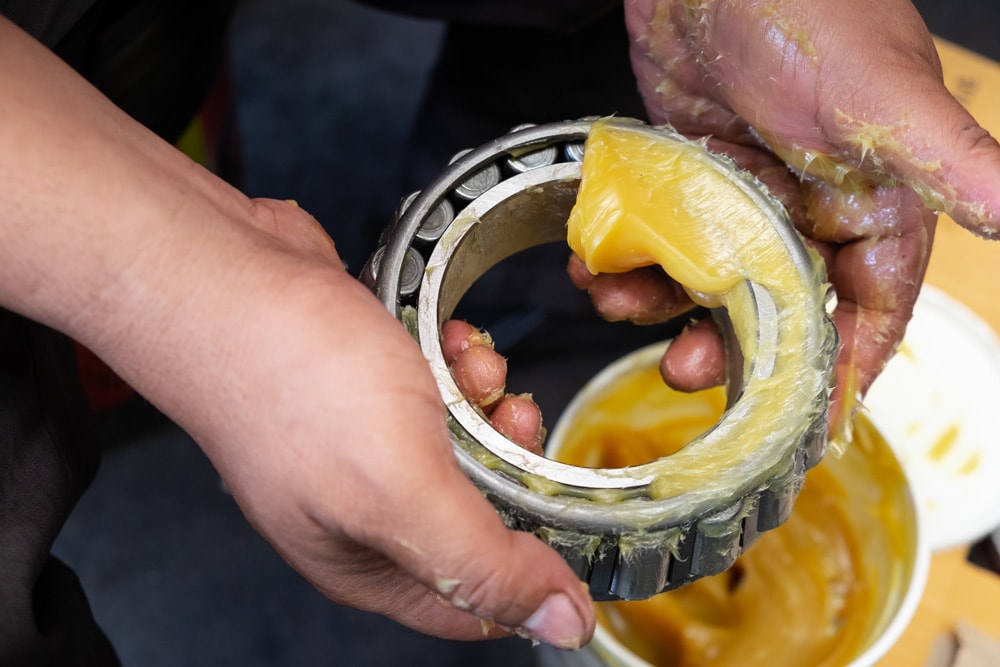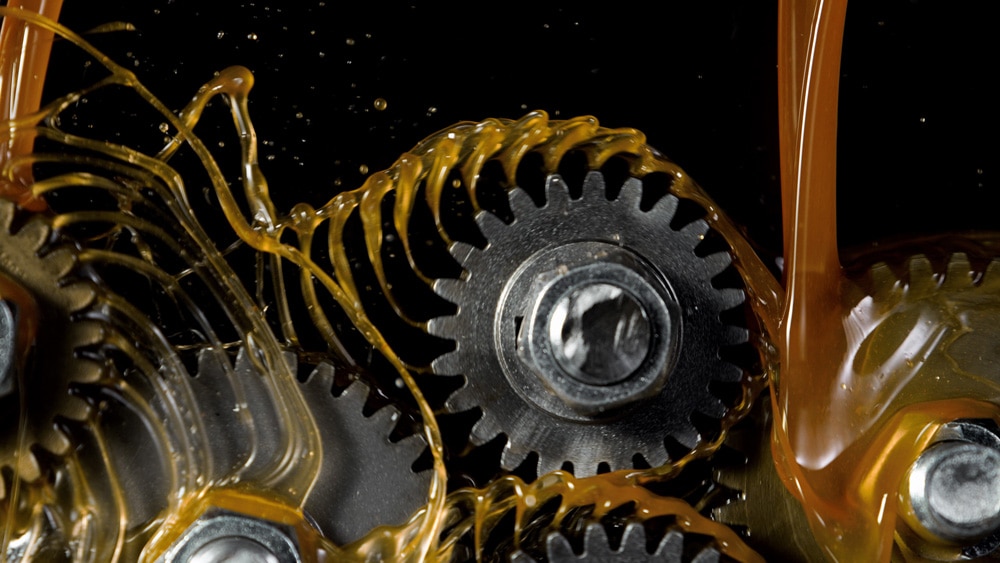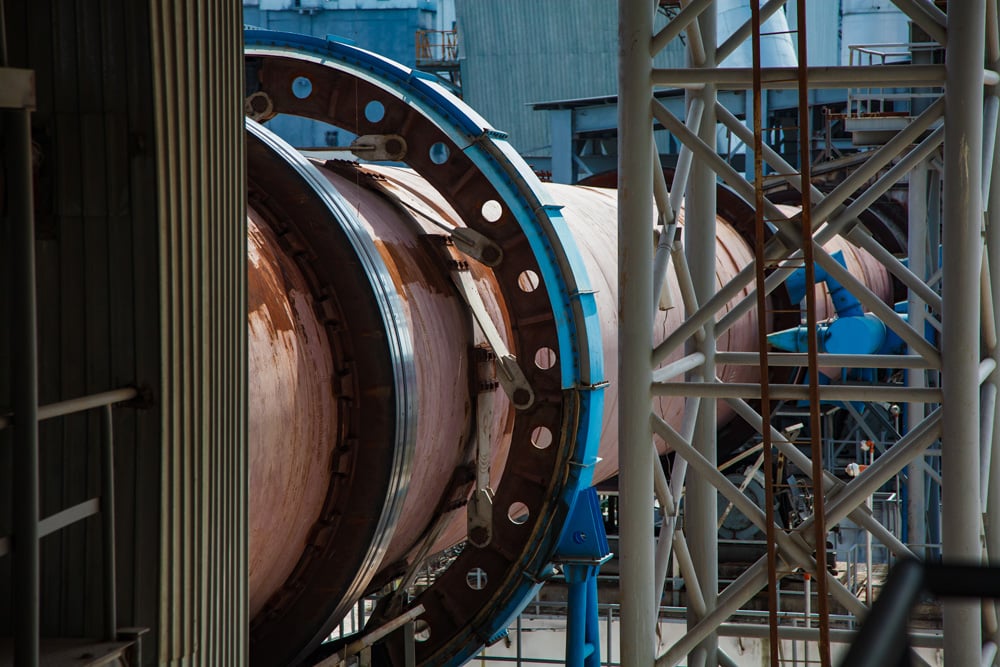Reliability program decreases costs at cement and lime plants
The cement and lime industry has some of toughest operating conditions in the industrial marketplace, including heavy loads, shock loads, temperature extremes, exposure to the elements and the constant presence of contaminants such as cement dust. To run their operations, they use a wide range of equipment, including ball mills, kilns, crushers, vertical mills, bucket elevators, conveyor systems and mobile plants. Lubrication Engineers understands the important role lubricants play in cement and lime operations. We have a wide range of high-performance greases and oils that will protect your equipment. However, LE doesn’t just sell enhanced lubricants; we sell lubricant reliability.
LE’s comprehensive lubrication reliability program can have an immediate impact by increasing machine life and decreasing machinery maintenance costs. It focuses on the use of correct lubricants as well as the proper care of these lubricants, which means ensuring that they are kept contaminant-free to extend the life of the lubricants as well as the expensive equipment they protect.
Extreme conditions require high-performance lubricants, greases and oils
Lubricants are not all made the same. In the high-impact, heavily contaminated applications such as those found in cement and lime plants, a high-performance lubricant can have a significant impact on reducing operating and maintenance costs. The critical equipment in these plants generally has to work 365 days a year, and every hour of downtime is expensive for the company. Lost production is very difficult to replace.
Following are some of the common lubricant suffering points for cement and lime operations, along with LE solutions.
- Failed bearings
Failed bearings in the cement industry
 Greases that do not seal effectively will allow contaminants to enter. LE has greases that are extremely tacky and nearly impervious to water washout, and can easily handle heavy shock loads. LE also offers automatic lubrication systems for making sure grease is applied in the right place, at the right time, in the right quantity.
Greases that do not seal effectively will allow contaminants to enter. LE has greases that are extremely tacky and nearly impervious to water washout, and can easily handle heavy shock loads. LE also offers automatic lubrication systems for making sure grease is applied in the right place, at the right time, in the right quantity. - Overheated gearboxes
Overheated gearboxes
 Cement plant gearboxes tend to be overloaded and consequently they often overheat, resulting in expensive premature wear and failure of the gears. Other common mechanical issues include emulsification of the gear oil due to water contamination and extreme foaming. LE’s range of Duolec® EP gear oils provide impressive protection against shock loading, a powerful anti-foaming package and outstanding water separation – the latter allowing any water contamination to be periodically drained off. This simple solution prevents rust and corrosion in the gearbox, and dramatically extends the life of the gear oil as well as the gearbox.
Cement plant gearboxes tend to be overloaded and consequently they often overheat, resulting in expensive premature wear and failure of the gears. Other common mechanical issues include emulsification of the gear oil due to water contamination and extreme foaming. LE’s range of Duolec® EP gear oils provide impressive protection against shock loading, a powerful anti-foaming package and outstanding water separation – the latter allowing any water contamination to be periodically drained off. This simple solution prevents rust and corrosion in the gearbox, and dramatically extends the life of the gear oil as well as the gearbox. - Worn open gears on kilns and ball mills
Worn open gears on kilns and ball mills
 Kilns and ball mills are two of the most critical pieces of equipment for cement plants; downtime is not an option for these applications. However, their open gears regularly suffer from pitting and other wear due to insufficient lubrication and shock loading. The use of asphaltic-based lubricants often means that this wear cannot be seen by maintenance personnel. Instead, elevated temperatures and vibrations are the indicators that there are problems. LE’s Pyroshield® Syn Hvy and XHvy open gear lubricants were designed specifically to provide outstanding protection for high-load, heavy-shock applications, such as these large shrouded open gears used in the cement and concrete industry. Pyroshield Syn open gear lubricants are non-asphaltic and environmentally friendly, containing no heavy metals. They are translucent in use, meaning that cement plant maintenance teams can inspect their open gears on a daily basis with the use of a strobe light. In addition, LE’s unique conversion process for Pyroshield allows kilns and ball mills to be converted without having to stop production.
Kilns and ball mills are two of the most critical pieces of equipment for cement plants; downtime is not an option for these applications. However, their open gears regularly suffer from pitting and other wear due to insufficient lubrication and shock loading. The use of asphaltic-based lubricants often means that this wear cannot be seen by maintenance personnel. Instead, elevated temperatures and vibrations are the indicators that there are problems. LE’s Pyroshield® Syn Hvy and XHvy open gear lubricants were designed specifically to provide outstanding protection for high-load, heavy-shock applications, such as these large shrouded open gears used in the cement and concrete industry. Pyroshield Syn open gear lubricants are non-asphaltic and environmentally friendly, containing no heavy metals. They are translucent in use, meaning that cement plant maintenance teams can inspect their open gears on a daily basis with the use of a strobe light. In addition, LE’s unique conversion process for Pyroshield allows kilns and ball mills to be converted without having to stop production.


